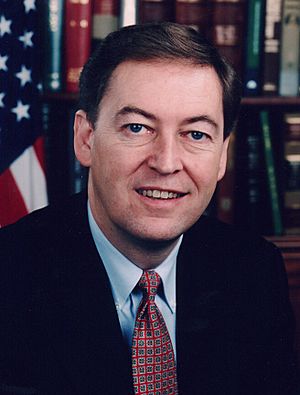Rod Grams facts for kids
Quick facts for kids
Rod Grams
|
|
|---|---|
 |
|
| United States Senator from Minnesota |
|
| In office January 3, 1995 – January 3, 2001 |
|
| Preceded by | David Durenberger |
| Succeeded by | Mark Dayton |
| Member of the U.S. House of Representatives from Minnesota's 6th district |
|
| In office January 3, 1993 – January 3, 1995 |
|
| Preceded by | Gerry Sikorski |
| Succeeded by | Bill Luther |
| Personal details | |
| Born |
Rodney Dwight Grams
February 4, 1948 Princeton, Minnesota, U.S. |
| Died | October 8, 2013 (aged 65) Crown, Minnesota, U.S. |
| Nationality | American |
| Political party | Republican |
| Spouse | Christine Gunhus |
| Alma mater | Brown College Anoka-Ramsey Community College Carroll University |
| Signature | |
Rodney Dwight Grams (born February 4, 1948 – died October 8, 2013) was an American politician. He was also a television news anchor. Grams served in both the United States House of Representatives and the U.S. Senate. He was a member of the Republican Party.
Before politics, Grams was a well-known news anchor. He worked at Twin Cities station KMSP-TV from 1982 to 1991. He was born on a farm in Princeton, Minnesota.
After leaving television, he ran for Congress in Minnesota's 6th congressional district. He won this election in 1992. He served one term in the House.
Then, he decided to run for the U.S. Senate. He won the 1994 Senate election. He served until 2001, when he lost his re-election bid to Mark Dayton.
Grams tried to get back into politics later. He ran for his old Senate seat in 2006. However, he dropped out before the main Republican vote. He also ran for the House again in Minnesota's 8th congressional district in 2006. He lost that election to Jim Oberstar.
Contents
Rod Grams's Early Life and Career
Rodney Dwight Grams was born on a farm in Princeton, Minnesota. He went to several colleges. These included Brown Institute (1966–68), Anoka-Ramsey Community College (1970–72), and Carroll College (1974–75).
Grams worked in television and radio for 23 years. From 1982 to 1991, he was the main news anchor at KMSP-TV in Minneapolis/St. Paul. Before that, he worked at other news stations. These included KFBB-TV in Great Falls, Montana, WSAU-TV in Wausau, Wisconsin, and WIFR-TV in Rockford, Illinois.
Before broadcasting, Grams worked for an engineering company for seven years. In 1985, he started his own construction company. It was called Sun Ridge Builders. He was the president and CEO. He also worked on designing buildings and using solar energy in homes.
Rod Grams's Start in Politics
Grams began his political journey in 1992. He won the Republican nomination for Minnesota's 6th congressional district. He then defeated the current Democratic representative, Gerry Sikorski, in the election.
During his campaign, many people in the district knew Grams. This was because of his years as a news anchor at KMSP-TV. He also benefited from some issues the current representative was facing.
Grams served in the 103rd Congress as a member of the House of Representatives. He then served in the 104th, 105th, and 106th congresses as a U.S. Senator.
Rod Grams as a U.S. Senator
Just a few months into his first term in the U.S. House, Grams announced he would run for the Senate. This surprised many people. The Senate seat was opening up because David Durenberger was not running again.
Grams faced other Republicans for the party's support. These included State Senator Gen Olson and Bert McKasy. Grams won the Republican endorsement after many votes at the party convention.
He also won the Republican primary election. He then faced Democratic Farmer Labor candidate Ann Wynia and Independence Party candidate Dean Barkley in the main election. Grams won the election with 49% of the votes.
Grams ran for re-election in 2000 but lost to Mark Dayton. During that campaign, his wife, Christine Gunhus, sent anonymous emails about a potential Democratic opponent. She was fined for breaking political advertising rules.
Rod Grams's Life After the Senate
After losing his re-election in 2000, Grams went back to private business. In 2004, he bought three radio stations in Little Falls, Minnesota.
He tried to return to politics in 2006. He wanted to get the Republican nomination for his old Senate seat. However, he dropped out early in the process. He then decided to run for the U.S. House again. He challenged the current representative, Jim Oberstar, in Minnesota's 8th congressional district. Oberstar easily defeated Grams.
Grams remained interested in politics. In 2008, he thought about running for the U.S. Senate again. However, he was too busy with his private life. He also wondered if he could still call himself a Republican. Despite this, Grams supported Republican Tom Emmer in the 2010 election for governor. Emmer lost that election to Mark Dayton.
Rod Grams's Illness and Death
On September 4, 2013, it was announced that Grams had been fighting colon cancer since 2012. He was receiving special care at his home. He passed away on October 8, 2013, at the age of 65. He died at his home in Crown, Minnesota.
Images for kids
See also

- In Spanish: Rod Grams para niños

